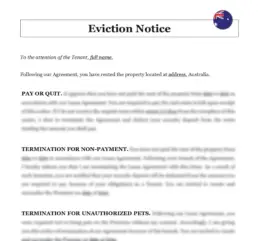Ready to use legal template
Drafted by experienced lawyers
Compliant with Australian law
Ready to use legal template
Drafted by lawyers
Compliant with Australian law
Home › Rent your property › Eviction notice
Learn more about Eviction Notice in Australia
In Australia, an Eviction Notice is a formal legal document served to a tenant to initiate the process of eviction from a rented property. Common reasons for eviction may include non-payment of rent, breach of lease terms, property damage, illegal activities on the premises, or failure to vacate the property after the lease term has expired. It is essential for landlords to follow the proper legal procedures when evicting a tenant, ensuring compliance with Australian tenancy laws and regulations. To assist landlords in this process, we provide an easy-to-edit legal template drafted by experts, enabling them to navigate the eviction process effectively.
Table of contents
What is an Eviction Notice and why is it important?
What are the valid reasons for evicting a tenant in Australia?
How much notice is required to evict a tenant in Australia?
Can I issue an Eviction Notice if the tenant is behind on rent payments?
Can I send this letter if the tenant has breached the terms of the lease?
What rights does the tenant have to contest an Eviction Notice in Australia?
Can I issue an Eviction Notice if the property is being sold or renovated?
What can be done if the tenant doesn't leave after receiving the letter?
What is an Eviction Notice and why is it important?
An eviction notice, also known as a Notice to Vacate, is a formal written document issued by a landlord to a tenant, informing them that they must vacate the premises within a specified period. It serves as the initial legal step in the eviction process, formally notifying the tenant of the landlord’s intention to regain possession of the property.
The eviction notice is important for several reasons. Firstly, it provides clear communication to the tenant about the landlord’s decision and establishes a timeline for the tenant to vacate the property. Additionally, it sets the legal groundwork for further action if the tenant fails to comply voluntarily, safeguarding the landlord’s rights and interests. Overall, an eviction notice ensures a structured and lawful process for resolving disputes and reclaiming possession of the property.
What are the valid reasons for evicting a tenant in Australia?
In Australia, landlords can evict tenants for various valid reasons recognized under the law. Common grounds for eviction include non-payment of rent, breach of lease terms, property damage, illegal activities on the premises, and the expiration of the lease term. However, it’s essential for landlords to adhere to the specific requirements outlined in state or territory legislation and ensure that they have sufficient grounds for eviction before proceeding with legal action.
How much notice is required to evict a tenant in Australia?
The notice period required to evict a tenant in Australia varies depending on several factors, including the reason for eviction, the type of tenancy agreement, and the relevant state or territory legislation. Generally, notice periods can range from 14 days to 90 days, with longer notice periods typically required for periodic leases or specific circumstances such as property renovation or sale. Landlords must comply with the notice requirements specified in the applicable legislation to ensure a lawful eviction process.
Can I issue an Eviction Notice if the tenant is behind on rent payments?
Yes, landlords can issue an eviction notice if the tenant is behind on rent payments. Non-payment of rent is a common reason for eviction in Australia, and landlords have the right to take appropriate action to address rent arrears and regain possession of their property. However, landlords must follow the correct legal procedures and provide the tenant with the required notice period to remedy the rent arrears or vacate the premises before proceeding with further action. It’s essential to ensure compliance with relevant laws and regulations to avoid potential disputes or legal challenges throughout the eviction process.
Can I send this letter if the tenant has breached the terms of the lease?
Yes, landlords can send an eviction notice if the tenant has breached the terms of the lease or tenancy agreement. It’s crucial to specify the nature of the breach in the eviction notice and provide evidence if possible. Common breaches may include unauthorized subletting, property damage, noise violations, or illegal activities on the premises. Landlords must ensure that the eviction notice complies with legal requirements and gives the tenant a reasonable opportunity to remedy the breach before proceeding with further action.
What rights does the tenant have to contest an Eviction Notice in Australia?
Tenants in Australia have various rights to contest an eviction notice, depending on the circumstances and grounds for eviction. Some common rights tenants may have include:
The right to dispute the validity of the eviction notice, including challenging the reason for eviction or the landlord’s compliance with legal requirements.
The right to apply to the relevant tribunal or court for a hearing to review the eviction notice and present evidence or arguments in defense of their tenancy.
The right to seek legal advice and representation to assist with contesting the eviction and protecting their rights under tenancy laws.
It’s essential for tenants facing eviction to understand their rights and seek appropriate legal advice to ensure their interests are protected throughout the eviction process.
Can I issue an Eviction Notice if the property is being sold or renovated?
Yes, landlords can issue an eviction notice if the property is being sold or undergoing significant renovations, subject to specific conditions and legal requirements. In some jurisdictions, landlords may be able to terminate a tenancy agreement on the grounds of selling the property or carrying out renovations that require vacant possession. However, landlords must comply with notice periods and other legal requirements outlined in state or territory legislation. Tenants may have certain rights or protections in these situations, such as the right to compensation or first refusal to re-rent the property after renovations are complete.
What can be done if the tenant doesn't leave after receiving the letter?
If the tenant doesn’t leave after receiving the eviction notice, landlords may need to take further legal action to regain possession of the property. Depending on the circumstances and applicable laws, landlords may apply to the relevant tribunal or court for an order of possession. The tribunal or court will review the case and, if satisfied, issue an order granting the landlord possession of the property and authorizing enforcement measures, such as eviction by bailiffs or sheriff’s officers. It’s essential for landlords to follow proper legal procedures and seek advice from legal professionals to ensure compliance with the law and avoid potential disputes or liabilities.
SPECIAL OFFER
Landlord
10 Document Package
Essential documents for managing rental property in Australia
Eviction NoticeTemplate (.docx)
Easy and quick to customize
310 client reviews (4.8/5) ⭐⭐⭐⭐⭐
Share information
Why Themis Partner ?
Make documents forhundreds of purposes
Hundreds of documents
Instant access to our entire library of documents for Australia.
24/7 legal support
Free legal advice from our network of qualified lawyers.
Easily customized
Editable Word documents, unlimited revisions and copies.
Legal and Reliable
Documents written by lawyers that you can use with confidence.




